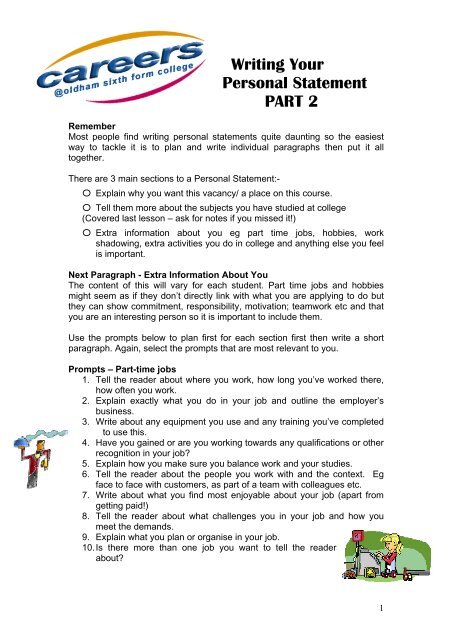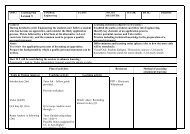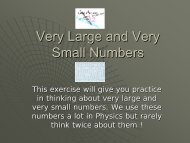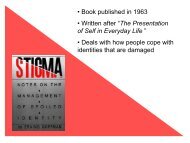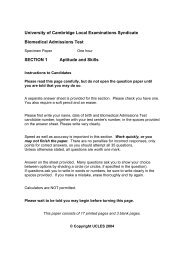Writing Your Personal Statement PART 2
Writing Your Personal Statement PART 2
Writing Your Personal Statement PART 2
You also want an ePaper? Increase the reach of your titles
YUMPU automatically turns print PDFs into web optimized ePapers that Google loves.
<strong>Writing</strong> <strong>Your</strong><br />
<strong>Personal</strong> <strong>Statement</strong><br />
<strong>PART</strong> 2<br />
Remember<br />
Most people find writing personal statements quite daunting so the easiest<br />
way to tackle it is to plan and write individual paragraphs then put it all<br />
together.<br />
There are 3 main sections to a <strong>Personal</strong> <strong>Statement</strong>:-<br />
o Explain why you want this vacancy/ a place on this course.<br />
o Tell them more about the subjects you have studied at college<br />
(Covered last lesson – ask for notes if you missed it!)<br />
o Extra information about you eg part time jobs, hobbies, work<br />
shadowing, extra activities you do in college and anything else you feel<br />
is important.<br />
Next Paragraph - Extra Information About You<br />
The content of this will vary for each student. Part time jobs and hobbies<br />
might seem as if they don’t directly link with what you are applying to do but<br />
they can show commitment, responsibility, motivation; teamwork etc and that<br />
you are an interesting person so it is important to include them.<br />
Use the prompts below to plan first for each section first then write a short<br />
paragraph. Again, select the prompts that are most relevant to you.<br />
Prompts – Part-time jobs<br />
1. Tell the reader about where you work, how long you’ve worked there,<br />
how often you work.<br />
2. Explain exactly what you do in your job and outline the employer’s<br />
business.<br />
3. Write about any equipment you use and any training you’ve completed<br />
to use this.<br />
4. Have you gained or are you working towards any qualifications or other<br />
recognition in your job?<br />
5. Explain how you make sure you balance work and your studies.<br />
6. Tell the reader about the people you work with and the context. Eg<br />
face to face with customers, as part of a team with colleagues etc.<br />
7. Write about what you find most enjoyable about your job (apart from<br />
getting paid!)<br />
8. Tell the reader about what challenges you in your job and how you<br />
meet the demands.<br />
9. Explain what you plan or organise in your job.<br />
10. Is there more than one job you want to tell the reader<br />
about?<br />
1
Prompts – Hobbies<br />
This can include whatever you do in the time that you are not studying,<br />
working, travelling, eating or sleeping. The reader wants to know that you are<br />
an interesting and varied person so tell them about what you do in your spare<br />
time even if it isn’t what you’d usually label as a hobby like ‘stamp collecting’<br />
for example.<br />
1. Tell the reader about what you do with your friends/ different groups of<br />
friends.<br />
2. What do you do with family or to help out at home?<br />
3. If you are a member of any clubs or organisations tell the reader what<br />
this involves.<br />
4. Apart from college and home, where do you go and what you do when<br />
you get there?<br />
5. Tell the reader about what you may get the opportunity to do only<br />
occasionally in your spare time.<br />
6. Tell the reader about any certificates or awards you have achieved<br />
outside college.<br />
Prompts - Work Shadowing / Work Experience/ Voluntary Work<br />
1. Tell the reader where you went and for how long.<br />
2. Explain the nature of where you went for your placement, business/<br />
service/ education/ healthcare etc.<br />
3. Describe who you worked with and what you did or observed.<br />
4. Give details of the equipment you used or observed in use.<br />
5. How did you know what you did or observed being done was worth<br />
doing?<br />
6. If you were only allowed to observe, explain that you understand the<br />
reasons for this.<br />
7. Tell the reader about anything unexpected.<br />
8. Tell the reader about what you found challenging.<br />
9. Tell the reader about anything you did for the first time.<br />
10. Give details of any feedback you got and how you know what<br />
impression you made.<br />
11. Were there any codes of practice or regulations you had to take into<br />
account during your placement?<br />
Anything else you feel is important<br />
1. Explain why if you have changed subjects/ had an extra year at<br />
college.*<br />
2. Explain if you are hoping to improve on grades and how you intend to<br />
do this.*<br />
3. Is there anything else to add that makes you stand out from the crowd?<br />
* This can be tricky to include but acknowledging difficulties and showing<br />
you’re overcoming them is usually a better approach than ignoring them.<br />
Seek advice if you’re not sure whether to include something.<br />
2
Final Paragraph – Why do you want this vacancy/ a place on this<br />
course?<br />
This paragraph would usually be at the start of a personal statement but it’s<br />
been left until last for two reasons. Firstly, it is often the paragraph student’s<br />
find most difficult and secondly, after writing the rest of the personal<br />
statement, you should now find this paragraph much easier.<br />
Through this paragraph you need to show<br />
1. You fully understand the key aspects of course/ job and how you will<br />
meet the requirements.<br />
2. You have genuine motivation to do it.<br />
3. You have considered how this course/ job will fit in with your future<br />
career.<br />
Look over what you have already written for the other sections. You might<br />
want to briefly mention something you have written about in detail in the other<br />
paragraphs. Use the prompts below to help you, picking out a few points that<br />
you think are most relevant to you.<br />
Prompts – Why?<br />
1. Tell the reader what opportunities you hope this course/ job will lead to.<br />
2. Briefly outline what you have already done that is similar to aspects of<br />
this job or course.<br />
3. Tell the reader what you are looking forward to about this job or course.<br />
4. If this is a completely new area for you, explain how you have<br />
researched it and what makes it suit you.<br />
5. If there are difficult aspects to this job or course, explain you are aware<br />
of this and how you will tackle this.<br />
6. Tell the reader how you will be building on current skills, qualities or<br />
knowledge through this job/ course.<br />
7. Briefly explain what happened to make you think ‘This is for me.’<br />
8. Explain what you will get out of doing this course/ job to make it<br />
worthwhile.<br />
Put it together<br />
Most people will begin their personal statement with the ‘Why this’ section but<br />
the best order for your other paragraphs will depend on what you are applying<br />
for. It’s up to you to decide on the best for you e.g.<br />
A good order for applying for a Geography Course at University<br />
o Paragraph 1 - Why Geography<br />
o Paragraph 2 - Studying geography in college and other subjects.<br />
o Paragraph 3 - Part- time job and hobbies.<br />
3
A good order for applying for a Nursing course at University<br />
o Paragraph 1 - Why Nursing<br />
o Paragraph 2 - Work experience and work shadowing relating to nursing<br />
o Paragraph 3 - Subjects studied in college.<br />
o Paragraph 4 - Part- time jobs and hobbies.<br />
A good order for applying for a job in banking<br />
o Paragraph 1 - Why Banking<br />
o Paragraph 2 - Part- time job in a customer service environment<br />
o Paragraph 3 - Subjects studied in college.<br />
o Paragraph 4 - Hobbies.<br />
Checking your <strong>Personal</strong> <strong>Statement</strong> – Does it say what it needs to say?<br />
Selecting who to interview from a number of applicants for a job or university<br />
course is difficult to do fairly so many admissions tutors and employers have<br />
their own set of criteria they will be checking for in your personal statement.<br />
Some even have a scoring system and they only interview the applicants with<br />
the highest scores and reject the rest. Check your personal statement against<br />
all the information they have provided on what they are looking for and add<br />
information if necessary.<br />
For university courses<br />
o Check against all the information provided in the course profile on<br />
www.ucas.com<br />
o Check against any additional information on the university website, the<br />
course department website and in the prospectus<br />
o NB if you have applied to 5 different universities, you will need to do<br />
this for each.<br />
For jobs<br />
o Check your statement against all the information provided about the<br />
job. This could be titled ‘Person Specification’ or ‘Essential Criteria’.<br />
o If the information isn’t very detailed, look the job up on Kudos or jobs4U<br />
and look through the ‘skills and qualities’ sections there for ideas.<br />
o You may need to adjust your <strong>Personal</strong> <strong>Statement</strong> slightly, even if<br />
applying for the same kind of job with different companies to ensure<br />
you always meet the criteria.<br />
And Finally<br />
o Use the spell check facility and proof read carefully<br />
to ensure your spelling and grammar is perfect.<br />
Remember For UCAS<br />
a maximum of 47 lines<br />
Times New Roman<br />
12 pt<br />
4


